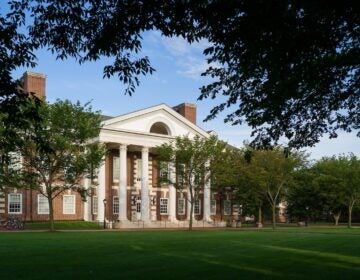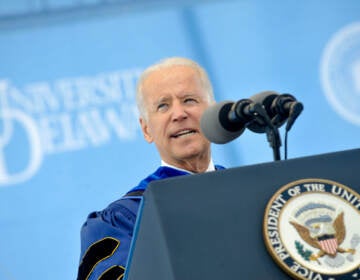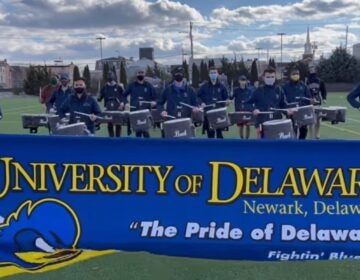Del., N.J., Pa. universities make ‘best of’ list for voter engagement efforts
The Washington Monthly magazine evaluates schools on contributions to social mobility, research and public service.

NextGen Pennsylvania holds a voter registration drive on the Drexel Campus. (NextGen Pennsylvania)
Pennsylvania voter registration ended on Tuesday, but there’s still time to sign up in Delaware and New Jersey to vote in the midterms.
Some of the recently registered may have been motivated by their schools.
The Washington Monthly magazine’s 13th annual college guide recognized 58 colleges for efforts to energize student voters. Several area schools made the list, including Penn State’s Main Campus, the University of Delaware, and Rutgers University New Brunswick. Cedar Crest College in Allentown was also listed among baccalaureate colleges.
Lindsay Hoffman, associate director of the University of Delaware’s Center for Political Communication, said student efforts helped propel the school toward the top.
“One is a student-led initiative called ‘Make It Count,’ where we have several public policy graduate students who are leading an effort for students to sign up online to get notifications about voting and registration through TurboVote,” she said. The school also participated in National Voter Registration Day.
“In 2016, our campus voter rate was almost 57 percent, which was higher than our 2012 voting rate which was only 48 percent,” Hoffman said.
And that’s a far cry from a decade ago when the Princeton Review described the school as politically apathetic.
“Surprised and excited” when she found out about the Washington Monthly 2018 ranking, Hoffman said she’d like to see the data become more sophisticated and include voter turnout rates.
Unlike other college ratings that might focus on academics or exclusivity, the Washington Monthly magazine evaluates schools on their contributions to social mobility, research and public service.
(The Princeton Review does acknowledge politically active schools, but it bases the information on student survey responses.)
Robert Kelchen, data editor for the Washington Monthly guide, said voting is another way of measuring a college’s commitment to service.
“We already had measures of what students are doing after college, join the Peace Corps; during college, join your ROTC,” said Kelchen, an assistant professor of higher education at Seton Hall University. “Then also looking at whether a college participates in AmeriCorps or service grants. But we want to reward colleges that are encouraging their students to at least register to vote.”
The universities that made the list are a mix of private, public and Ivy League schools.
“This is not something that only the elite wealthy colleges can do. This is something that colleges can encourage on a pretty low budget,” he said.
The college guide used four measures to identify the most voter-engaged schools.
The first was whether an institution participated in the Tufts University’s National Study of Learning, Voting, and Engagement and whether the school released that data publicly. A college got a point if it signed up for the ALL IN Campus Democracy Challenge and, finally, another point for making that action plan public.
Rutgers University New Brunswick was another school achieving “best of” honors.
“We’re really at this moment, an important moment, where not only we’re seeing heightened awareness of the role that campuses can play and should play to foster the sense of civic engagement and political participation, but I’m hopeful too that we’re seeing a shift among young adults,” said Elizabeth Matto, who directs the Center for Youth Political Participation at Rutgers’ Eagleton Institute of Politics.
Matto co-edited a book that looked at universities with high voter turnout.
“How do we foster a campus culture that produces not only high voting turnout rates but actually really prepares our students to be informed and engaged citizens?” she said.
Washington Monthly may include campus voting rates in next year’s college guide, Kelchen said.
The 2018 guide also ranked schools on vocational programs for the first time.
WHYY is your source for fact-based, in-depth journalism and information. As a nonprofit organization, we rely on financial support from readers like you. Please give today.




